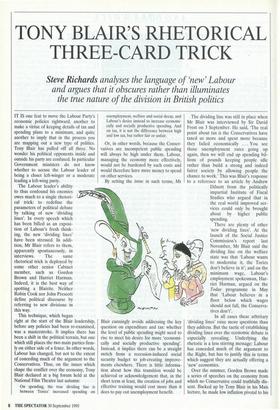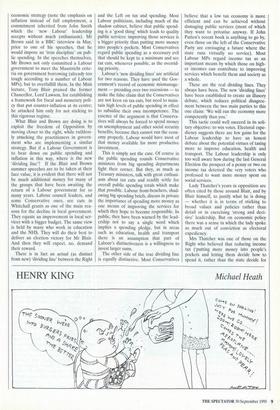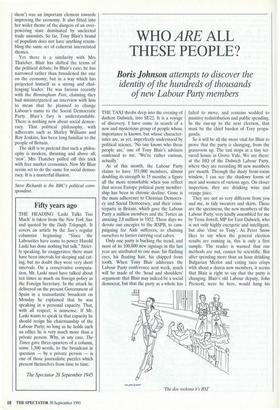TONY BLAIR'S RHETORICAL THREE-CARD TRICK
Steve Richards analyses the language of 'new' Labour
and argues that it obscures rather than illuminates the true nature of the division in British politics
IT IS one feat to move the Labour Party's economic policies rightward, another to make a virtue of keeping details of tax and spending plans to a minimum, and quite another to imply that in the process you are mapping out a new type of politics. Tony Blair has pulled off all three. No wonder his political opponents inside and outside his party are confused. In particular Government ministers do not know whether to accuse the Labour leader of being a closet left-winger or a moderate leading a left-wing party.
The Labour leader's ability to thus confound his enemies owes much to a single rhetori- cal trick: to redefine the parameters of political debate by talking of new `dividing lines'. In every speech which has been billed as an exposi- tion of Labour's fresh think- ing, the new 'dividing lines' have been stressed. In addi- tion, Mr Blair refers to them, apparently spontaneously, in interviews. The same rhetorical trick is deployed by some other senior Cabinet member, such as Gordon Brown and Harriet Harman. Indeed, it is the best way of spotting a Blairite. Neither Robin Cook nor John Prescott define political discourse by referring to new divisions in this way.
This technique, which began right at the start of the Blair leadership, before any policies had been re-examined, was a masterstroke. It implies there has been a shift in the political terrain, but one which still places the two main parties firm- ly on either side of a fence. In other words, Labour has changed, but not to the extent of conceding much of the argument to the Conservatives. Thus, on the issues which shape the conflict over the economy, Tony Blair declared at a big forum held at the National Film Theatre last autumn: On spending, the true dividing line is between Tories' increased spending on
unemployment, welfare and social decay, and Labour's desire instead to increase economi- cally and socially productive spending. And on tax, it is not the difference between high and low tax, but rather fair or unfair.
Or, in other words, because the Conser- vatives are incompetent public spending will always be high under them. Labour, managing the economy more effectively, would not be burdened by such costs and would therefore have more money to spend on other services.
By setting the issue in such terms, Mr Blair cunningly avoids addressing the key question on expenditure and tax: whether the level of public spending might need to rise to meet his desire for more 'economi- cally and socially productive spending'. Instead, it implies there can be a straight switch from a recession-induced social security budget to job-creating improve- ments elsewhere. There is little informa- tion about how this transition would be achieved or acknowledgement that, in the short term at least, the creation of jobs and effective training would cost more than it does to pay out unemployment benefit. The dividing line was still in place when Mr Blair was interviewed by Sir David Frost on 3 September. He said, `The real point about tax is the Conservatives have taxed us more and spent more because they failed economically . . . You see those unemployment rates going up again, then we will end up spending bil- lions of pounds keeping people idle rather than build a strong and indeed fairer society by allowing people the chance to work.' This was Blair's response to a reference to an article by Andrew Dilnott from the politically impartial Institute of Fiscal Studies who argued that in the real world improved ser- vices could only be brought about by higher public spending.
There are plenty of other `new dividing lines'. At the launch of the Social Justice Commission's report last November, Mr Blair said the dividing line on the welfare state was that `Labour wants to modernise it, the Tories don't believe in it'; and on the minimum wage, Labour's employment spokesman, Har- riet Harman, argued on the Today programme in May that 'Labour believes in a floor below which wages should not fall, the Conserva- tives don't'.
In all cases these arbritary `dividing lines' raise more questions than they address. But the tactic of establishing dividing lines over the economic debate is especially revealing. Underlying the rhetoric is a less stirring message: Labour has conceded much of the argument to the Right, but has to justify this in terms which suggest they are actually offering a `new' economics.
Over the summer, Gordon Brown made a series of speeches on the economy from which no Conservative could truthfully dis- sent. Backed up by Tony Blair in his Mais lecture, he made low inflation pivotal to his economic strategy (note the emphasis on inflation instead of full employment, a commitment inherited from John Smith which the 'new Labour' leadership accepts without• much enthusiasm). Mr Brown said in a BBC interview in May, prior to one of his speeches, that he would impose an 'iron discipline' on pub- lic spending. In the speeches themselves, Mr Brown not only committed a Labour government to meet the Maastricht crite- ria on government borrowing (already too tough according to a number of Labour MPs), but to overfulfill them. In the Mais lecture, Tony Blair praised the former Chancellor, Lord Lawson, for establishing a framework for fiscal and monetary poli- cy that put counter-inflation at its centre; he attacked him only for not sticking to this rigorous regime.
What Blair and Brown are doing is to exploit the freedom of Opposition by moving closer to the right, while ruthless- ly attacking the practitioners in govern- ment who are implementing a similar strategy. But if a Labour Government is to bear down on public spending and inflation in this way, where is the new `dividing line'? If the Blair and Brown summer speeches are to be taken at their face value, it is evident that there will not be much additional money for many of the groups that have been awaiting the return of a Labour government for so many years. Labour council leaders, and some Conservative ones, see cuts in Whitehall grants as one of the main rea- sons for the decline in local government. They equate an improvement in local ser- vices with a bigger budget. The same view is held by many who work in education and the NHS. They will do their best to deliver an election victory for Mr Blair. And then they will expect, no, demand their reward.
There is in fact an actual (as distinct from new) 'dividing line' between the Right and the Left on tax and spending. Most Labour politicians, including much of the shadow cabinet, believe that public spend- ing is a 'good thing' which leads to quality public services: improving those services is a bigger priority than putting more money into people's pockets. Most Conservatives regard public spending as a necessary evil that should be kept to a minimum and see tax cuts, whenever possible, as the overrid- ing priority.
Labour's 'new dividing lines' are artificial for two reasons. They have used the Gov- ernment's record of economic mismanage- ment — presiding over two recessions — to make the false claim that the Conservatives are not keen on tax cuts, but need to main- tain high levels of public spending in effect to subsidise their own incompetence. The essence of the argument is that Conserva- tives will always be forced to spend money on unemployment and other social security benefits, because they cannot run the econ- omy properly. Labour would have most of that money available for more productive investment.
This is simply not the case. Of course in the public spending rounds Conservative ministers from big spending departments fight their corner. But they, as much as Treasury ministers, talk with great enthusi- asm about tax cuts and readily settle for overall public spending totals which make that possible. Labour front-benchers, shad- owing big spending briefs, discuss in private the importance of spending more money as one means of improving the services for which they hope to become responsible. In public, they have been warned by the lead- ership not to say a single word which implies a spending pledge, but in areas such as education, health and transport there is an assumption that part of Labour's distinctiveness is a willingness to invest larger sums.
The other side of the true dividing line is equally distinctive. Most Conservatives believe that a low tax economy is more efficient and can be achieved without damaging public services (most of which they want to privatise anyway. If John Patten's recent book is anything to go by, even those on the left of the Conservative Party are envisaging a future where the state runs virtually no service). Most Labour MPs regard income tax as an important means by which those on high- er incomes can contribute to improving services which benefit them and society as a whole.
These are the real dividing lines. They always have been. The new 'dividing lines' have been established to create an illusory debate, which reduces political disagree- ment between the two main parties to this one claim: 'We will run the economy more competently than you.'
This tactic could well succeed in its soli- tary objective: to win votes. Electoral expe- diency suggests there are few gains for the Labour leadership to have an honest debate about the potential virtues of taxing more to improve education, health and transport. The Labour leadership is only too well aware how during the last General Election the prospect of a penny or two on income tax deterred the very voters who professed to want more money spent on social services.
Lady Thatcher's years in opposition are often cited by those around Blair, and by Blair himself, to justify what he is doing — whether it is in terms of sticking to broad values and policies rather than detail or in exercising 'strong and deci- sive' leadership. But on economic policy there was a sense in which the lady spoke as much out of conviction as electoral expediency.
Mrs Thatcher was one of those on the Right who believed that reducing income tax Cputting more money into people's pockets and letting them decide how to spend it, rather than the state decide for them') was an important element towards improving the economy. It also fitted into her wider theme of the dangers of an over- powering state dominated by unelected trade unionists. So far, Tony Blair's brand of populism does not have anything resem- bling the same set of coherent interrelated themes.
Yet there is a similarity with Mrs Thatcher. Blair has shifted the terms of the political debate. In Blair's case, he has narrowed rather than broadened the one on the economy, but in a way which has projected himself as a strong and chal- lenging leader. He was furious recently with the Birmingham Post, claiming they had misinterpreted an interview with him to mean that he planned to change Labour's name to the Social Democratic Party. Blair's fury is understandable. There is nothing new about social democ- racy. That political philosophy, with adherents such as Shirley Williams and Roy Jenkins, has been long familiar to the people of Britain.
The skill is to pretend that such a philos- ophy is modern, thrusting and above all, `new'. Mrs Thatcher pulled off this trick with free market economics. Now Mr Blair seems set to do the same for social democ- racy. It is a masterful illusion.
Steve Richards is the BBC's political corre- spondent.




































































 Previous page
Previous page